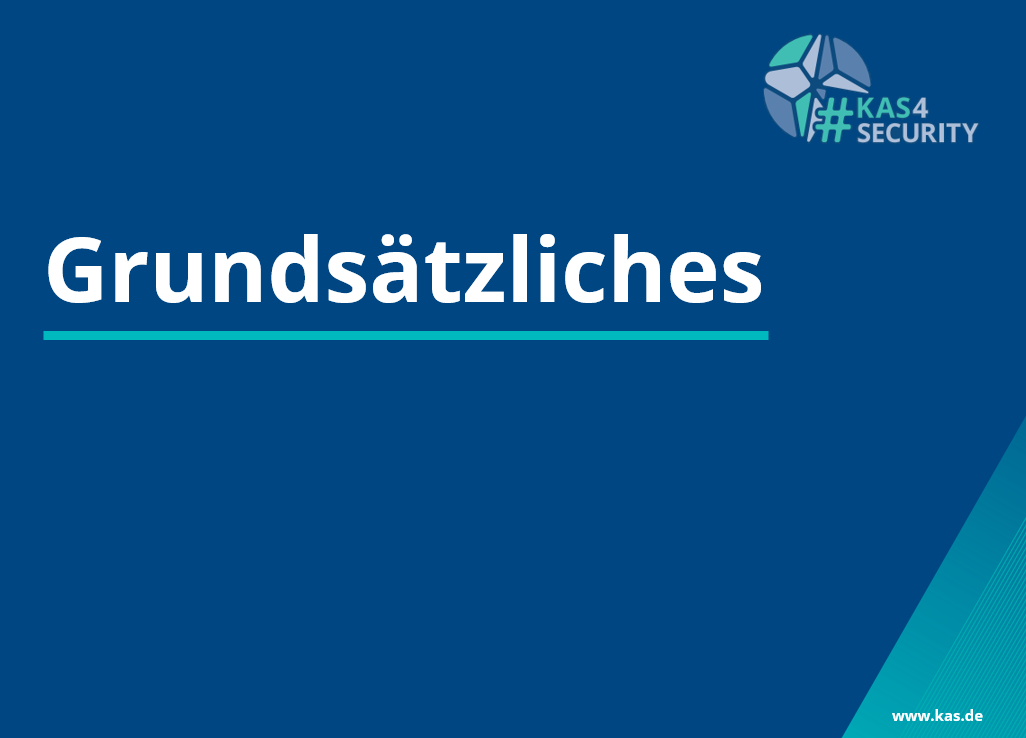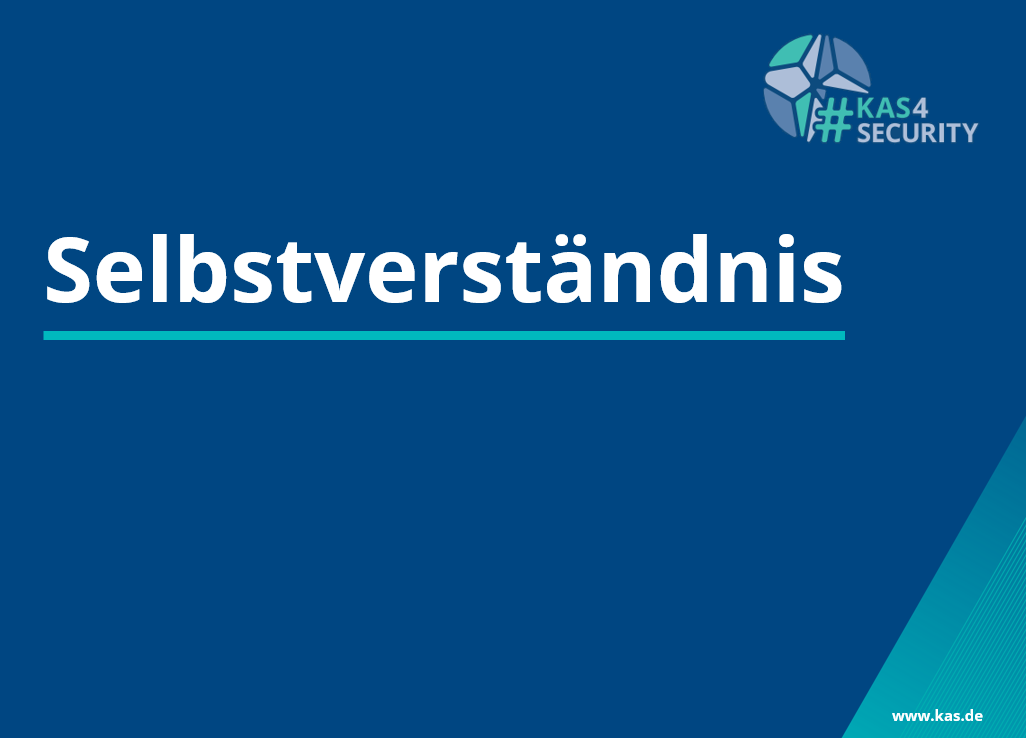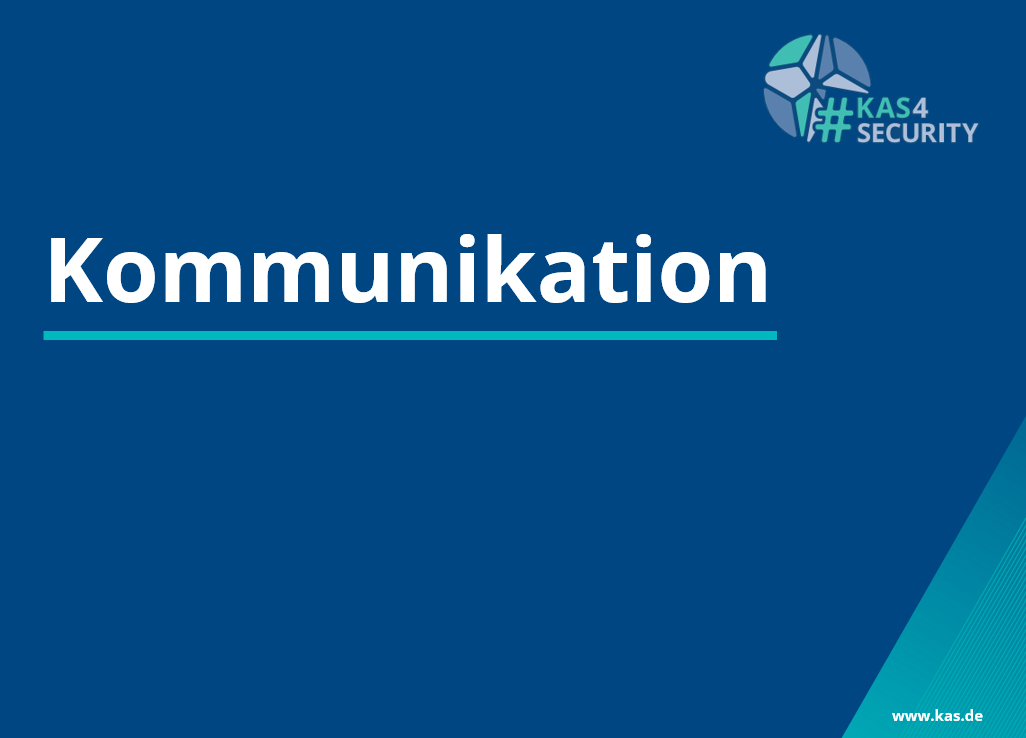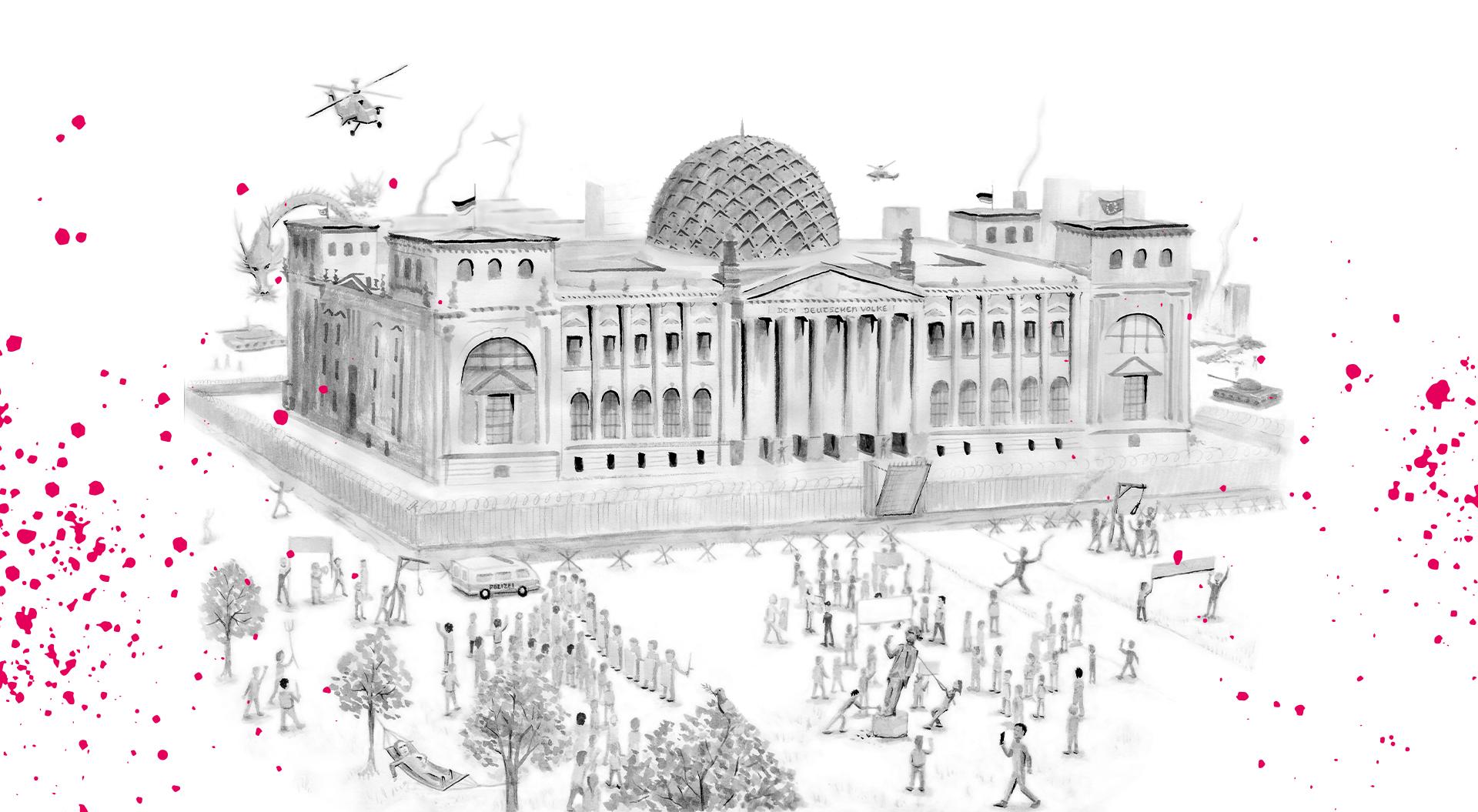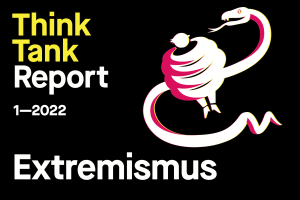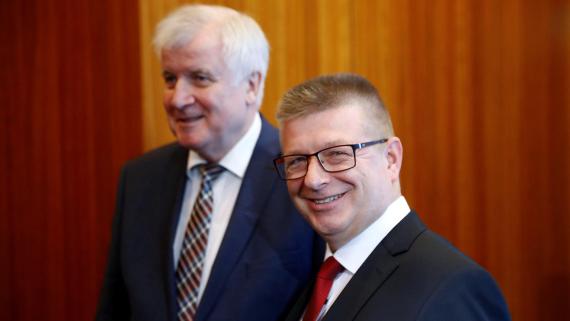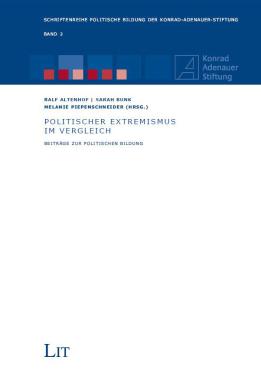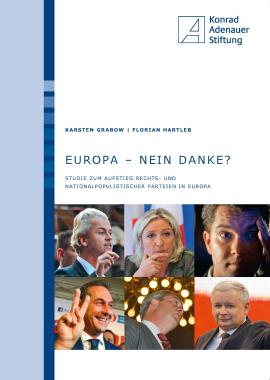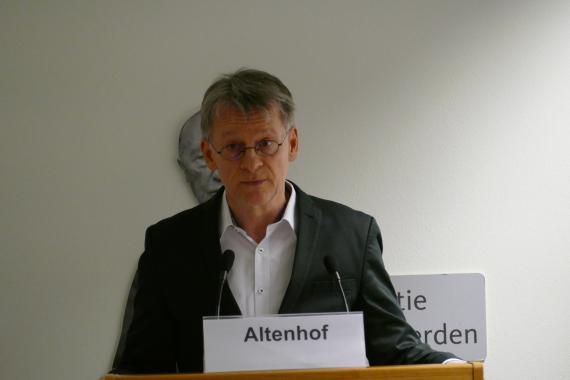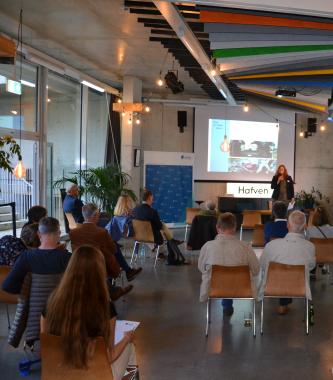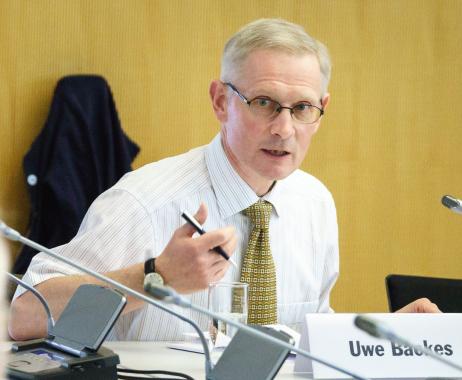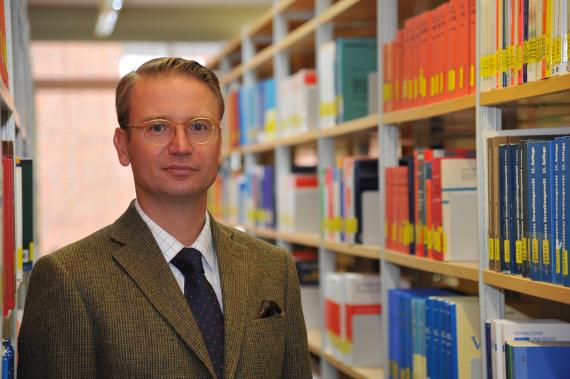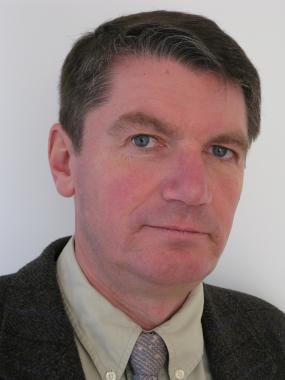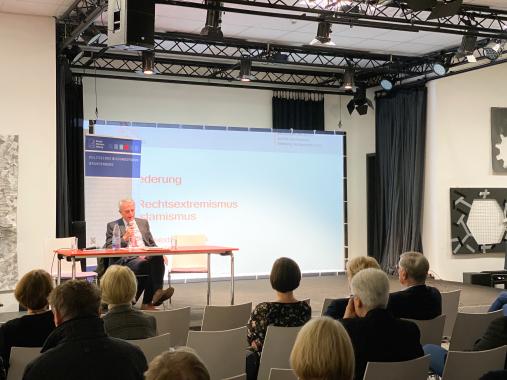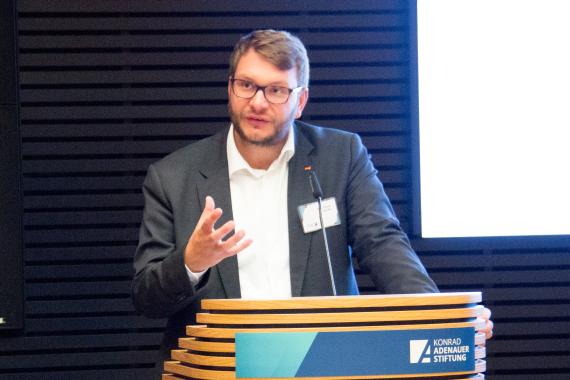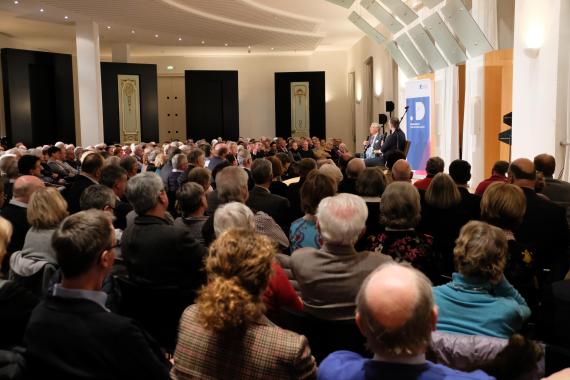Right-Wing Extremism - Extremism
We recognise that 76 years after the Shoah, we have an obvious and threatening problem with right-wing extremism and racism.
At a glance
- Right-wing extremism of today is fascist and contemptuous towards others. It is directed against pluralism and democracy and wholeheartedly rejects our liberal democratic basic order.
- Right-wing extremist ideologies in Germany are predominantly shaped by a racist view of humanity, xenophobia and anti-Semitism.
- Strong democratic institutions as well as political education measures, both de-radicalising and preventative, are needed to successfully combat right-wing extremism.
- The Konrad-Adenauer-Stiftung fundamentally opposes political extremism. We thus promote discussions on the phenomenon of right-wing extremism and contribute our part to preserving democracy.
Content
2. Fighting right-wing extremism consistently and continuously
3. Mission democracy! Us against right-wing extremism
4. Our offers and projects on the topic
5. Publications, events and media contributions on the topic
Concept and problem
As is well known, right-wing extremism in its various forms and manifestations has a long tradition in Europe and especially in Germany. The term, as we use it today, originated in the German authorities, which used it to designate the “distance of a certain political spectrum from the most important values of the Basic Law (human rights, democracy, and rule of law). Right-wing extremism which has emerged in the Federal Republic since 1949, uncompromisingly rejects democracy as “un-German” or a “dictate of occupation”, and wants to replace it with a system that is more or less reminiscent of the political order of the defunct National Socialism” (Rudolf van Hüllen). From a scientific perspective, there are, however, differences to National Socialism under the Third Reich.
The right-wing extremism we talk of today describes a fascist, contemptuous ideology that rejects a pluralistic and democratic society and is therefore directed against our liberal democratic fundamental order and thus the constitution. The ideology of right-wing extremism assumes the right of the strongest, whereby it is oriented towards a racist image of humanity. In Germany, the ideology is particularly characterised by xenophobia and anti-Semitism.
Fighting right-wing extremism consistently and continuously
The murder of Walter Lübcke as well as terrorist attacks in Halle and Hanau have raised our society’s awareness about a danger of which we should never have lost sight – at least since the NSU murders: Right-wing extremism is a direct problem within our society, representing a danger to millions of our fellow citizens. The victims of the most recent attacks exemplify the enemy stereotype of right-wing extremists and show which groups or people are most affected by the danger. Politics and authorities must protect these people while at the same time preventing right-wing extremist ideology from spreading to the centre of society.
In order to overcome this challenge, we need stronger democratic institutions that are consistently committed to fighting right-wing extremism. This includes the preventative approach of political education and the offer of support and de-radicalisation after leaving right-wing extremist circles. Equally important, however, is the work of the police and constitutional protection offices, which need to take the prosecution of endangerers, and thus potential right-wing extremists, seriously, and make it their priority.
At the same time, more attention needs to be paid to international developments. The global networking of right-wing extremists has increased dramatically in recent years, and particularly with the help of digital channels, has crossed language and national borders. For a few years, both experts and authorities have been observing how European and American right-wing extremists travel to countries – mainly in Eastern Europe – where there is conflict, or which are known for training right-wing extremists in the use of weapons and explosives. After returning to their home countries, these people may become a danger there.
Mission democracy! Us against right-wing extremism
As the Konrad-Adenauer-Stiftung, we stand against all forms of extremism and align our work accordingly. In cooperation with experts, politicians, associations, organisations, and citizens, we encourage discussion on this phenomenon of right-wing extremism, and play our role in preserving democracy.
Editorial
The editorial gives you a short thematic introduction to the project. Here you will find, among other things, a list of all authors who have been involved in the texts of the five chapters “Fundamentals”, “Structural”, “Goals”, “Self-conception”, and “Communication”.
Fundamentals
The “Fundamentals” chapter deals with the functioning and basics of right-wing extremism. With various contributions, we provide information on the many questions that arise in connection with the term. What is right-wing extremism and what distinguishes it? What is fascism and National Socialism really about? What role do anti-Semitism and racism play? We also address questions on right-wing extremists’ image of reality or their relationship to violence as means of politics in this section.
Structural
In the “Structural” chapter, we clarify right-wing extremist forms of organisation and the special features of the neo-Nazi scene. How do right-wing extremism and terrorism relate to each other? Which neo-Nazi parties and small parties exist in Germany besides the NPD? What are autonomous nationalists and free comradeships? This section will also provide relevant information on rather loose groups such as the Reichtsbürgerbewegung (Reich Citizenship Movement).
Goals
In the “Goals” chapter, the main focus is placed on the long-term objectives pursued by right-wing extremists. In this context, we discuss common questions on the design of political, economic and social conditions as sought by right-wing extremists. This includes, for example, clarification of common terms in right-wing extremist jargon such as “Volksgemeinschaft” (people’s community) or “Natürliche Ordnung” (natural order).
Self-Conception
In the “Self-conception” chapter, you will find articles that deal with the role models of right-wing extremists, among other things. Who were Otto Ernst Remer or Rudolf Hess, for example? Why do right-wing extremists glorify criminal organisations such as the Waffen-SS? How do modern right-wing extremists relate to and identify themselves with historical National Socialism? Issues such as historical revisionism and the perception of the Holocaust and the Shoa from the perspective of right-wing extremists will also be discussed in this section.
Communication
The “Communication” chapter is primarily dedicated to codes, symbols and the clothing of right-wing extremists. In this context, typical scene music as well as common means of communication and deception to win new supports for the right-wing scene are also addressed.
Publication projects
Democracy cannot be taken for granted. It needs to be lived, cultivated and, if necessary, actively defended – whether that be against right-wing extremist tendencies or other dangers. Our publication project on “Defensive Democracy” is devoted to the protection of our democracy, and illustrates topics such as extremism, radicalisation, populism, nationalism or revisionism, to name a few.
Defensive Democracy
Russia’s attack on Ukraine has catapulted the question of the defensibility of democracy to the fore of public interest. Yet, tanks and rockets are not the only threat to our free society. Our democracy is exposed to many dangers, which are addressed in our book of essays and a major campaign.
Learn more about the topic “Defensive Democracy” or go directly to the essay collection “die wehrhafte(re) Demokratie” (The (More) Defensive Democracy).
Didactic offers
With our DigitalAkademie Pupil and Teacher Academies, we present pupils and teachers with a specific offer when it comes to preventing extremism online.
DigitalAkademie
The digital world presents teachers and pupils with enormous challenges. Even though digitalisation opens up a plethora of opportunities and harbours great potential for new diverse or unusual methods and concepts of teaching, the internet is also a space of uncertainty, fake news and seduction.
Extremists in particular use the net to influence young people and young adults. As part of our Pupil and Teacher Academies, we offer a wide range of services in extremism prevention, with which we not only warn against this kind of influence, but also raise general awareness of the issue. We explain extremist methods on the net, help to identify extremism on the net and provide teachers with the tools to confidently address incidents and experiences with extremism in the classroom.
Working group
In 2015, the Konrad-Adenauer-Stiftung established the Working Group Terrorism and Domestic Security. It sees itself as a network for experts on these issues.
Working Group Terrorism and Domestic Security
The Working Group Terrorism and Domestic Security focuses on the threat posed by Islamist, left- and ring-wing extremism, among other things. Members of the Working Group regularly get together to exchange views on political developments and current problems and to work out solutions.
Learn more about the Working Group Terrorism and Domestic Security




